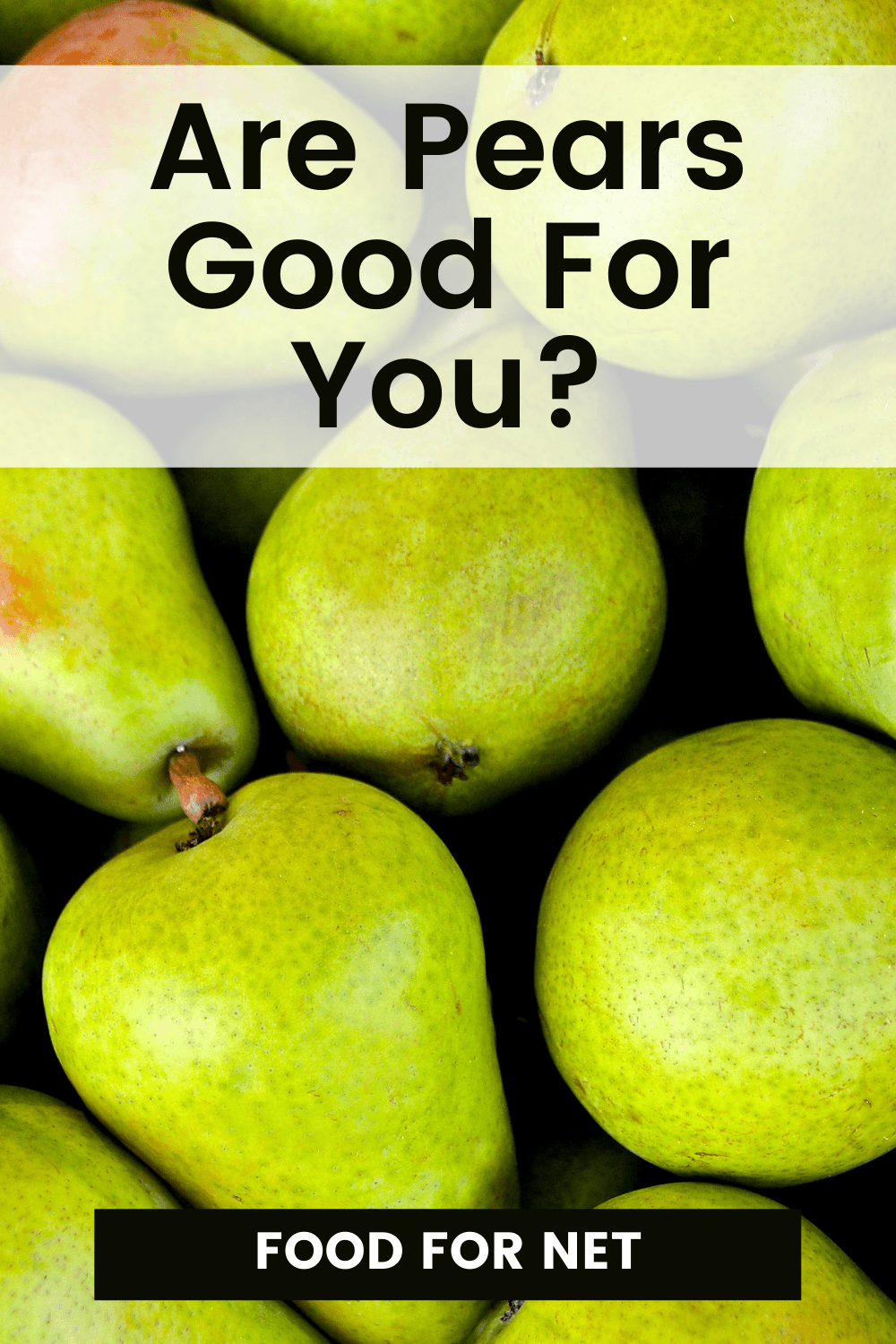
Pears are a delicious and sweet bell-shaped fruit that are never quite as popular as apples, but are just as tasty and nutritious. Plus, with more than 100 varieties to choose from, it’s not difficult to find a type of pear that you love – but are pears good for you? Today though, we’re interested in the health implications. Are pears good for you or are they are type of fruit to be avoided?
After all, fruit isn’t all the same. You have options like raspberries, which are rich in fiber and relatively low in sugar, to the point that they can fit on a keto diet. Then there are bananas, which can be very high in sugar when they’re fully ripe.
And pears? Let’s take a close look to see what they have to offer.
Are Pears Good For You?
- Benefits Of Pears
- When Pears Might Be A Problem
- Are Pears Keto Friendly?
- Types Of Pears
- Can You Be Allergic To Pears?
- Final Thoughts
Benefits Of Pears
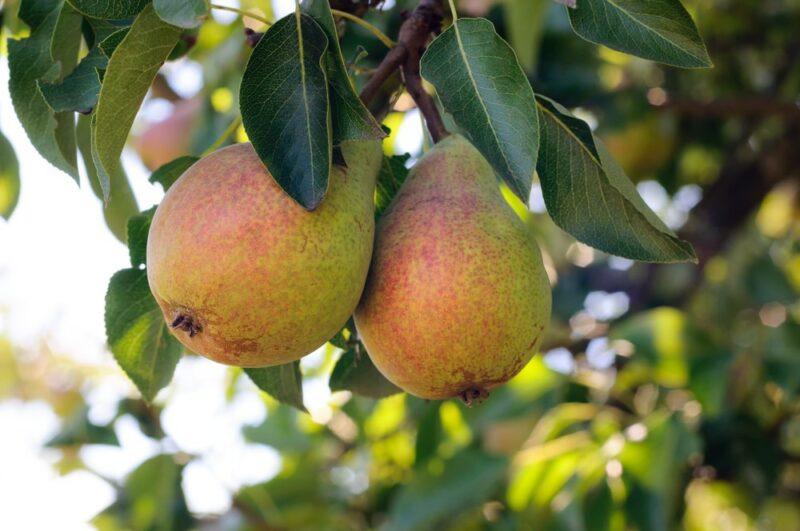
Their Nutrient Profile
Pears, like most fruits and vegetables, are a fantastic source of nutrients. These nutrients are all essential for keeping you healthy and making sure that your body functions well. For example, vitamin C is often linked to your immune system, while vitamin K is relevant for blood clotting and calcium regulation.
For a medium pear, the nutrient balance looks like this:
- Calories: 103
- Carbohydrates: 27.5 grams
- Fiber: 5.5 grams
- Sugars: 17.4 grams
- Fat: 0.2 grams
- Protein: 0.7 grams
- Vitamin C: 12% daily value (DV)
- Vitamin K: 10% DV
- Copper: 7% DV
- Potassium: 6% DV
There are also smaller amounts of magnesium, folate, phosphorous, calcium, and iron.
The Fiber
Pears are surprisingly powerful for fiber. You get around 5.5 grams of fiber in a single medium pear, which is around 20% of the amount that you need each day.
Honestly, this fiber is all the reason you need to eat pears regularly. After all, fiber is a critical part of our digestive system, helping to bulk out our stools and maintain regular bowel movements. Fiber can also keep us feeling full, which is very relevant for weight loss.
Studies have linked fiber to other benefits too, like decreasing blood sugar levels and lowering cholesterol. Those effects could then decrease your risk of type 2 diabetes and heart disease, respectively.
They Decrease Heart Disease Risk
Pears have been linked to decreased heart disease risk in other ways too, partly due to their antioxidant content. One of these antioxidants is quercetin. This may help to decrease cholesterol levels, blood pressure, and inflammation. Pretty impressive for a single antioxidant, right?
There are also procyanidin antioxidants. These have been linked to cholesterol improvements as well.
These effects aren’t just theoretical. Research shows that eating fresh pears daily really can improve heart disease risk factors.
Like most types of fruit, pears are also low in fat. This may be relevant for heart health as well, especially if you’re having a pear instead of something high in saturated fat.
Relatively Low GI
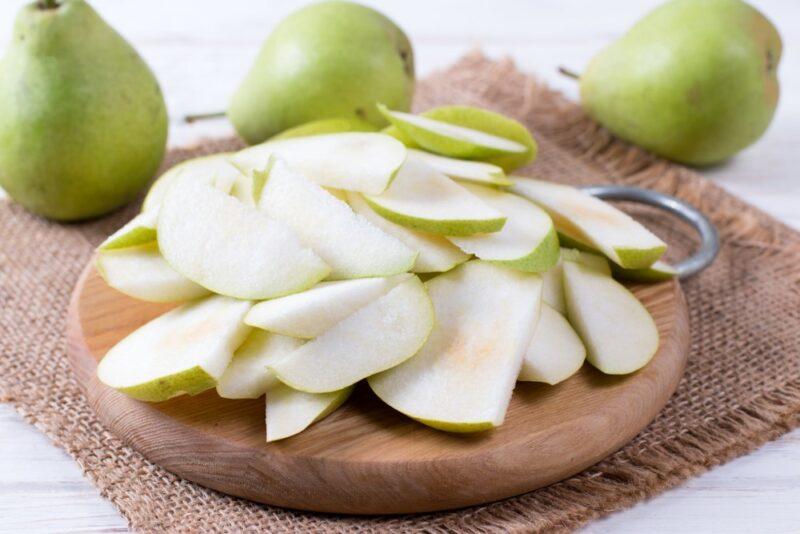
Pears have a relatively low glycemic index (GI) score, due to their high fiber content. This low GI means that they don’t have dramatic impacts on blood sugar. Instead, the sugar reaches your bloodstream more slowly.
Low GI fruits like pears may be particularly important for diabetics, who need to pay close attention to their blood sugar levels.
After all, cutting fruit out of your diet entirely isn’t a wise idea. The antioxidants and other plant-based compounds in fruit play many important roles in your health, so you still need some of them, even if you are closely watching your sugar intake.
Studies even show that whole fruits like pears can reduce the risk of type 2 diabetes and help with diabetes management.
Can Help With Weight Loss
Despite their sugar content, pears can be very relevant for weight loss. Their fiber is part of the reason for this effect – because, as discussed earlier, fiber helps you to feel full.
The filling effect of fiber might seem trivial, but it’s really not. Think about it. We make most of our bad food decisions when we’re hungry, often reaching for unhealthy snacks because they’re tasty or close at hand.
Finding healthy food that keeps us full can decrease the calories we consume, which easily leads to weight loss. Some willpower is still needed, but that’s true for every single weight loss strategy known to man.
Pears have other weight loss advantages too, including the fact that they’re low in calories and contain a decent amount of water. Plus, pears take a while to eat. By the time you’ve got all the way through one, you’re probably not interested in eating anything else.
They’re A Whole Food
Foods like fruits, vegetables, and legumes stand out because they’re often high in fiber, contain a decent number of nutrients, and are relatively unprocessed. These features are all important, especially these days, when processed food is so prevalent.
Moving away from processed options and towards whole foods like pears is a powerful way to promote health. Indeed, diets rich in these types of foods are linked to many positive outcomes, like a decreased risk of diabetes, stroke, heart disease, and more.
When Pears Might Be A Problem
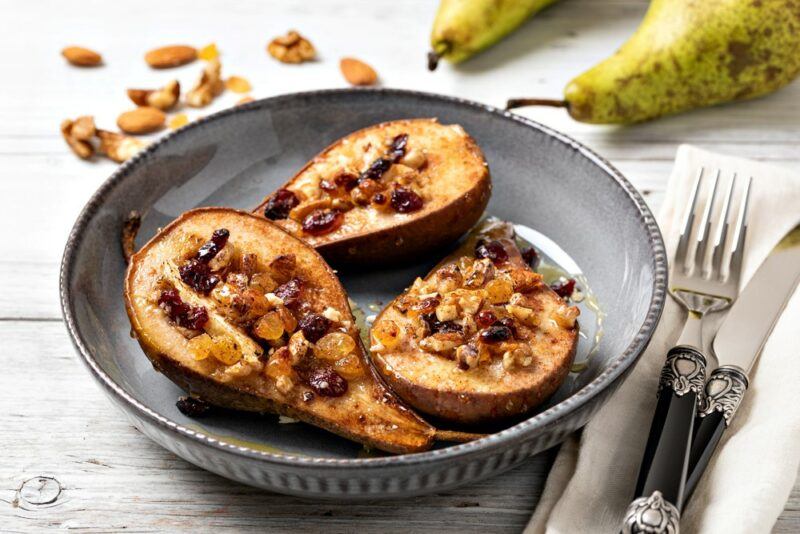
They’re High In FODMAPs
FODMAPs are a collection of sugars that our bodies don’t completely absorb. They tend to move slowly through our digestive system and can be fermented in the large intestine.
This fermentation process may have some health benefits, but it also produces gas, which can cause significant discomfort for people with sensitive guts. Because of this effect, high FODMAP foods often cause significant side effects for people with irritable bowel syndrome or related digestive conditions.
Pears are high FODMAP foods because they contain a decent amount of fructose and sorbitol.
Now, fructose itself isn’t unusual. It’s the sugar that you find in all fruits. However, apples and pears both contain excessive amounts of fructose, more than most other types of fruit.
If you are sensitive to FODMAPs, it’s best to avoid pears entirely. There are plenty of low FODMAP fruits that you can tur not instead, including oranges, pineapple, and strawberries.
They Can Have A Laxative Effect
Pears are high in fiber, while also containing a decent amount of sorbitol and fructose. This combination of features can have a laxative-like effect.
This effect might be appealing if you’re constipated, but in any other situation, it is likely to be frustrating. The laxative effect can also make diarrhea symptoms worse, so you’ll want to avoid pears when you’re not feeling well.
Pears Can Be Contaminated With Pesticides
Pesticide residues are another important topic to think about. These come from the pesticides that are used to keep crops free of pests.
Pesticides have been researched and the levels of pesticide residues on our food is thought to be safe. Still, there’s plenty of debate about whether that’s the case or not. There’s still the chance that pesticide residues could cause noticeable harm.
This doesn’t mean that you need to avoid all conventionally grown fruits and vegetables. Many of them have low levels of pesticides. The trick is to pay attention to fruits with high pesticide levels, which include pears.
For pears, along with cherries, strawberries, grapes, and nectarines, it’s best to look for the organic version whenever you can.
Are Pears Keto Friendly?
Fruit is always tricky on a keto diet. After all, it can be relatively high in sugar, which isn’t what you want when you’re keeping your carbs low. Yet, fruit is also important, as it contains plenty of fiber and some antioxidants that are hard to find elsewhere.
Pears are towards the high end when it comes to carbs. You get 12 net grams of carbs per 100 grams of pear. This is fewer carbs than in bananas, grapes, and mango, but more than in peaches, oranges, and most berries.
You can still eat pears on a keto diet, but only if you keep your portion sizes small and have enough leeway in your carb intake. Most of the time. though, pears aren’t worth the bother. You’ll get similar benefits from fruits with fewer digestible carbs.
Types Of Pears

As you might expect, there are plenty of different pear varieties. However, they all fall into two categories – European and Asian.
European pears should be instantly familiar, as these have the shape that we all recognize (heavy at the bottom with curves) and have smooth skin.
Asian pears, on the other hand, look more like apples at first glance, rather than pears. Their texture and flavor are noticeably different than European pears, although both types are delicious.
Some key types of pears to look out for include Forelle, Bosc, Anjous, and Nashi. Each type goes by multiple names, just to be confusing, although you can easily experiment with different types until you find your favorites.
Despite differences in appearance and flavor, the nutritional profile is similar across all types of pears. As such, you’ll see the same benefits and risks regardless of the type you choose.
Can You Be Allergic To Pears?
Pear allergies are incredibly uncommon, to the point that doctors sometimes use pears as a bridge to get children through other fruit allergies. Despite this, pear allergies are still possible.
As with most allergies, symptoms range from minor to severe, including diarrhea, wheezing, itching, and swelling of the face. Anaphylaxis is also possible in severe cases.
If you think you have a pear allergy, talking to your doctor is the best first step. They’ll be able to advise you about what to do next, which might include avoiding pears entirely.
Final Thoughts
Pears have many powerful features, including their low GI and their considerable fiber content. As such, pears can help to protect against diabetes, while providing many antioxidants and nutrients at the same time.
However, pears won’t always be the best type of fruit. Their FODMAP content may be too high for anyone with irritable bowel syndrome or a similar condition.
As always, it’s important to pay attention to your body and choose the best type of fruit for your needs.
Frequently Asked Questions
Are Pears Good For Diabetics?
Pears are surprisingly helpful for diabetics, as they can help to balance your blood sugar levels, which decreases the risk of diabetic complications. Pears can be even better than apples, as they’re often lower in sugar and higher in fiber.
Even the sugar in pears is helpful, as this can make you feel like you’ve had a treat. This effect can potentially reduce cravings for unhealthy snacks and make it easier to stay healthy.
Are Pears Acidic?
Pears have a pH of between 3.5 and 4, which easily places them into the acidic range. However, they’re not as acidic as some other fruits, including lemons and limes.
In fact, the acidity of pears is low enough that people with acid reflux can sometimes eat them without a problem. This is helpful, as the fiber in pears could improve your gut health and reduce acid reflux symptoms in the long term.
Do Pears Ripen After Picking?
Unusually, pears tend to ripen only after they’ve been picked, rather than beforehand. As such, the pears you buy from the store may not be fully ripe. The same is true for any you harvest yourself.
Can You Eat Pear Skin?
While pear skin is fairly tough and high in fiber, it is completely edible. Eating it can also be helpful, as the skin provides many valuable nutrients.
Still, if you find the skin too tough or not enjoyable, you can peel the pear instead. You get plenty of nutrients from the flesh regardless.
Do Pears Need To Be Refrigerated?
If pears are not yet ripe, they should be kept out of the fridge until they have fully ripened. This includes pears you purchase from the store, as these are often a little underripe.
Once the pears are ripe, they can be kept on the counter or in the fridge. They’ll last longer in the fridge, but storing them there isn’t essential.


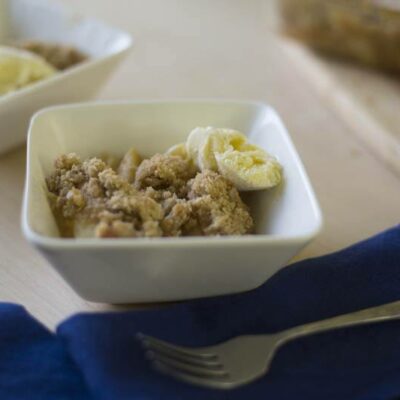



 The Best Juice With Vodka
The Best Juice With Vodka
Leave a Reply